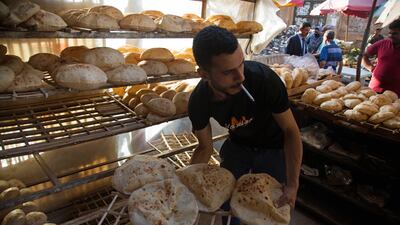Egypt will buy 180,000 tonnes of wheat from India and is actively looking at ways to extract more flour from the grain and use potatoes to make bread as it moves to trim imports.
The quantity is less than the 500,000 tonnes agreed on initially, Supply Minister Aly Moselhy said.
“Based on what the supplier said, the condition was that the wheat has to be at the ports, then it would be available,” he told a news conference on Sunday, according to Reuters.
“We had agreed on 500,000 tonnes; turns out [the supplier] has 180,000 tonnes in the port.”
Mr Moselhy said Egypt was also discussing a wheat purchase agreement with Russian suppliers.
The North African country, one of the world's biggest wheat importers, has purchased much of its grain from the Black Sea in recent years.
However, shipments were disrupted by Russia's invasion of Ukraine, with the conflict also driving up wheat import costs.
Egypt mainly relies on imported wheat to ensure bread, which is heavily subsidised, is available to more than 70 million of its 103 million people.
Mr Moselhy announced in May that the North African country had agreed to buy 500,000 tonnes of wheat from India as part of measures to diversify its import sources.
India banned wheat exports during the same month but made allowances for countries such as Egypt that faced a food security challenge.
Separately, Egypt is looking at ways to derive more flour from wheat and raise the extraction percentage for flour used in subsidised bread to 87.5 per cent, from 82 per cent currently, Mr Moselhy said.
That could result in the country importing between five million and 5.5 million tonnes of wheat for the 2022-2023 fiscal year, 500,000 tonnes lower than in the previous year.
Another idea being tested was supplementing wheat flour with potatoes.
“We are looking at the technology now,” Mr Moselhy said.
Current wheat reserves are sufficient for about six months after 3.9 million tonnes were harvested locally, said Mr Moselhy.











